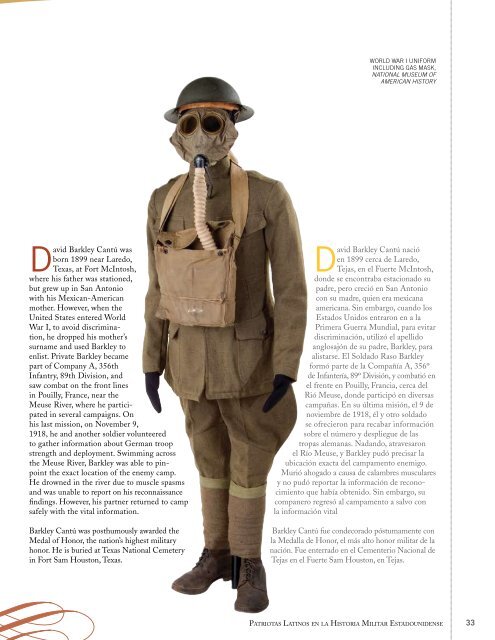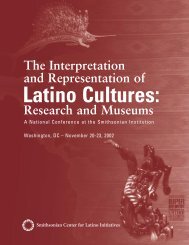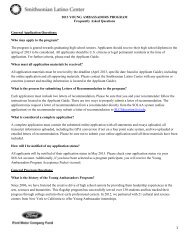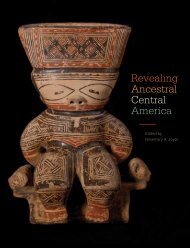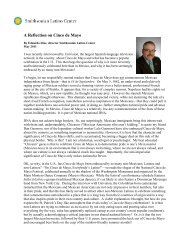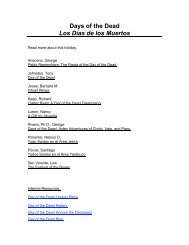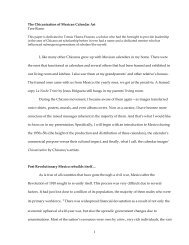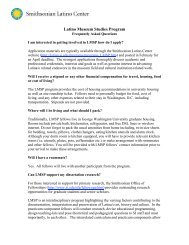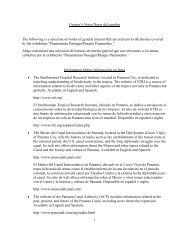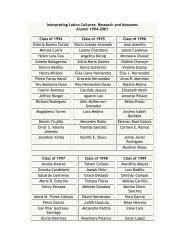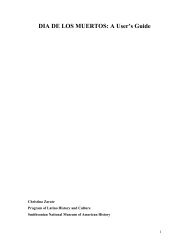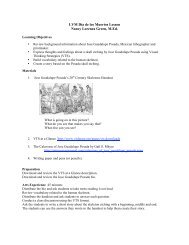(1861–1865) la Guerra Civil - Smithsonian Latino Center ...
(1861–1865) la Guerra Civil - Smithsonian Latino Center ...
(1861–1865) la Guerra Civil - Smithsonian Latino Center ...
You also want an ePaper? Increase the reach of your titles
YUMPU automatically turns print PDFs into web optimized ePapers that Google loves.
World War I uniform<br />
including gas mask,<br />
National Museum of<br />
American History<br />
David Barkley Cantú was<br />
born 1899 near Laredo,<br />
Texas, at Fort McIntosh,<br />
where his father was stationed,<br />
but grew up in San Antonio<br />
with his Mexican-American<br />
mother. However, when the<br />
United States entered World<br />
War I, to avoid discrimination,<br />
he dropped his mother’s<br />
surname and used Barkley to<br />
enlist. Private Barkley became<br />
part of Company A, 356th<br />
Infantry, 89th Division, and<br />
saw combat on the front lines<br />
in Pouilly, France, near the<br />
Meuse River, where he participated<br />
in several campaigns. On<br />
his <strong>la</strong>st mission, on November 9,<br />
1918, he and another soldier volunteered<br />
to gather information about German troop<br />
strength and deployment. Swimming across<br />
the Meuse River, Barkley was able to pinpoint<br />
the exact location of the enemy camp.<br />
He drowned in the river due to muscle spasms<br />
and was unable to report on his reconnaissance<br />
findings. However, his partner returned to camp<br />
safely with the vital information.<br />
Barkley Cantú was posthumously awarded the<br />
Medal of Honor, the nation’s highest military<br />
honor. He is buried at Texas National Cemetery<br />
in Fort Sam Houston, Texas.<br />
David Barkley Cantú nació<br />
en 1899 cerca de Laredo,<br />
Tejas, en el Fuerte McIntosh,<br />
donde se encontraba estacionado su<br />
padre, pero creció en San Antonio<br />
con su madre, quien era mexicana<br />
americana. Sin embargo, cuando los<br />
Estados Unidos entraron en a <strong>la</strong><br />
Primera <strong>Guerra</strong> Mundial, para evitar<br />
discriminación, utilizó el apellido<br />
anglosajón de su padre, Barkley, para<br />
alistarse. El Soldado Raso Barkley<br />
formó parte de <strong>la</strong> Compañía A, 356º<br />
de Infantería, 89º División, y combatió en<br />
el frente en Pouilly, Francia, cerca del<br />
Rió Meuse, donde participó en diversas<br />
campañas. En su última misión, el 9 de<br />
noviembre de 1918, él y otro soldado<br />
se ofrecieron para recabar información<br />
sobre el número y despliegue de <strong>la</strong>s<br />
tropas alemanas. Nadando, atravesaron<br />
el Río Meuse, y Barkley pudó precisar <strong>la</strong><br />
ubicación exacta del campamento enemigo.<br />
Murió ahogado a causa de ca<strong>la</strong>mbres muscu<strong>la</strong>res<br />
y no pudó reportar <strong>la</strong> información de reconocimiento<br />
que había obtenido. Sin embargo, su<br />
companero regresó al campamento a salvo con<br />
<strong>la</strong> información vital<br />
Barkley Cantú fue condecorado póstumamente con<br />
<strong>la</strong> Medal<strong>la</strong> de Honor, el más alto honor militar de <strong>la</strong><br />
nación. Fue enterrado en el Cementerio Nacional de<br />
Tejas en el Fuerte Sam Houston, en Tejas.<br />
33


